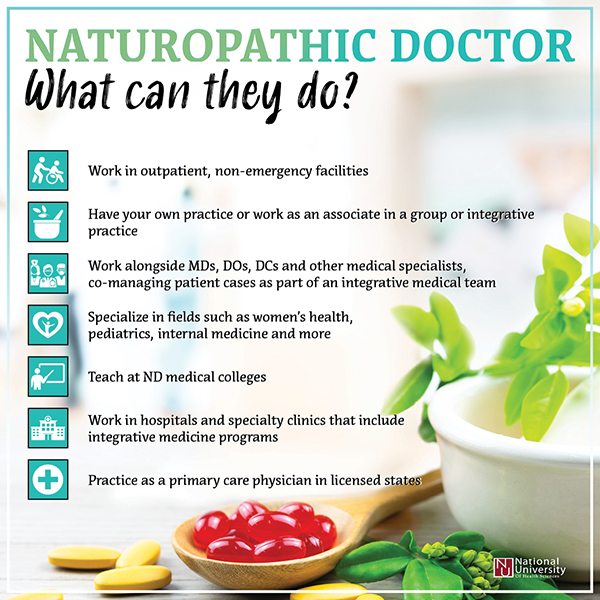Jane Drobin grew up with parents who were interested in alternative medicine—but it wasn’t until she started looking into natural lifestyles for herself that she discovered naturopathic remedies were aligned with her personal interests.
Her further research into naturopathic medicine programs led her to National University of Health Sciences. Do you share Jane’s passion for a career in natural health care? If so, here is what you need to know about naturopathic doctors and what they can do!
What is a Naturopathic Doctor?
Let’s start with the basics. A naturopathic doctor is a practitioner of naturopathic medicine—a system of primary health care focused on the diagnosis, treatment and prevention of illness using the healing powers of nature.
Naturopathic doctors treat holistically by looking at each patient as a whole person, rather than only focusing on one specific symptom, disease or diagnosis. This means considering all the factors that comprise a person’s overall health, including a combination of genetics, environmental exposures, lifestyle habits, diet, exercise history and social/emotional factors. The ultimate goal of naturopathic care is restoring balance in the body to support its natural healing process.
At its core, naturopathic medicine is distinguished by six underlying principles:
- First, Do No Harm: Use the most natural, least invasive and least toxic therapies.
- The Healing Power of Nature: Trust in the body’s inherent wisdom to heal itself.
- Identify and Treat the Causes: Look beyond the symptoms to the underlying cause.
- Doctor as Teacher: Educate patients about the steps to achieving and maintaining health.
- Treat the Whole Person: View the body as an integrated whole in all its physical and spiritual dimensions.
- Prevention: Focus on overall health, wellness and disease prevention.
What Can a Naturopathic Doctor Do?
Naturopathic doctors are highly trained diagnosticians that rely on the least invasive and least toxic therapies to address the underlying causes of health issues —not just the condition itself. By going to the root of the problem, naturopathic remedies support the body’s own ability to prevent and combat disease, inflammation and deterioration.
Naturopathic doctors also specialize in preventative care. Preventative medicine means establishing habits now that help ward off health issues later. Naturopathic doctors are increasingly being sought out to effectively help their patients develop and stick to healthier practices that will improve their overall long-term health and well-being.
For the millions of Americans with chronic conditions, naturopathic doctors aim to provide relief by offering holistic perspectives and treatment options. They are able to address a broad range of chronic health issues such as diabetes, asthma, heart disease, allergies, chronic pain, digestive issues, respiratory conditions, fertility issues, menopause and chronic fatigue syndrome.

This has caused a spike in popularity for this field and more support among legislators to license naturopathic doctors in states across the country. In fact, there are more than 5,000 practicing naturopathic physicians in North America—a number that has tripled in the last 10 years.
Where can naturopathic physicians work? As a naturopathic doctor, you would be able to:
- Work in outpatient, non-emergency facilities
- Have your own practice or work as an associate in a group or integrative practice
- Specialize in fields such as women’s health, pediatrics, internal medicine and more
- Teach at ND medical colleges
- Work in hospitals and specialty clinics that include integrative medicine programs to offer naturopathic therapies to patients in collaboration with traditional medicine
- Work alongside MDs, DOs, DCs and other medical specialists, co-managing patient cases as part of an integrative medical team
- Practice as a primary care physician in licensed states (22 states, the District of Columbia, Puerto Rico, the U.S. Virgin Islands and five Canadian provinces at this time, with many more considering legislation)
What Does Naturopathic Care Involve?
Naturopathic physicians use a blend of traditional treatment methods (such as performing minor surgery and ordering labs or x-rays) and holistic therapies (such as leveraging botanical medicine) to manage a broad range of health conditions.
Many of the therapies they rely on support the body’s intrinsic self-repair mechanisms. Rather than simply treating a patient’s symptoms through naturopathic remedies then sending them on their way, they look for underlying imbalances and the root causes of ailments. Then they are able to determine what is truly necessary to support and re-balance the body’s natural healing process.
Healing methods for naturopathic doctors can include nutrition counseling, botanical medicine, homeopathic treatment, hydrotherapy and minor surgery.
How Can You Become a Naturopathic Doctor?
After acquiring a bachelor’s degree, you can begin working toward a rewarding career as a naturopathic doctor by attending a university that has been accredited by the Council on Naturopathic Medical Education (CNME). This accreditation is necessary in order to get licensure for practice.
Naturopathic physicians are well-trained and study the latest advances in conservative and noninvasive modalities to prevent illnesses and manage patient symptoms. You would be taking courses in anatomy, physiology, biochemistry, pathology, pharmacology and more, as well as completing a minimum of 4,100 hours of class and clinical training.
To practice as a naturopathic physician in the U.S. or Canada, you must also pass the Naturopathic Physicians Licensing Exam (NPLEX) conducted by the North American Board of Naturopathic Examiners (NABNE). Once you have passed, you would then be able to apply for licensure in the state or province in which you plan to practice.
Naturopathic doctors are considered primary care physicians that are able to diagnose, prevent and treat illnesses in licensed states. In most pre-licensed states, naturopaths cannot diagnose or treat ailments but are able to serve as health consultants or wellness coaches, and may use botanical medicine or homeopathy. Check with the state where you want to practice to understand its requirements. To learn more about how you can start a naturopathic career in a pre-licensed state, read the success stories of NUHS grads!
To learn more about what it takes to become a naturopathic doctor, get a first-hand perspective from our Naturopathic Medicine Student Blog! Or, request more information about our accredited and highly respected program and what it takes to apply today!
{{cta(‘e2bbb13c-0841-4021-80f7-62bf3f520a39’)}}




0 Comments